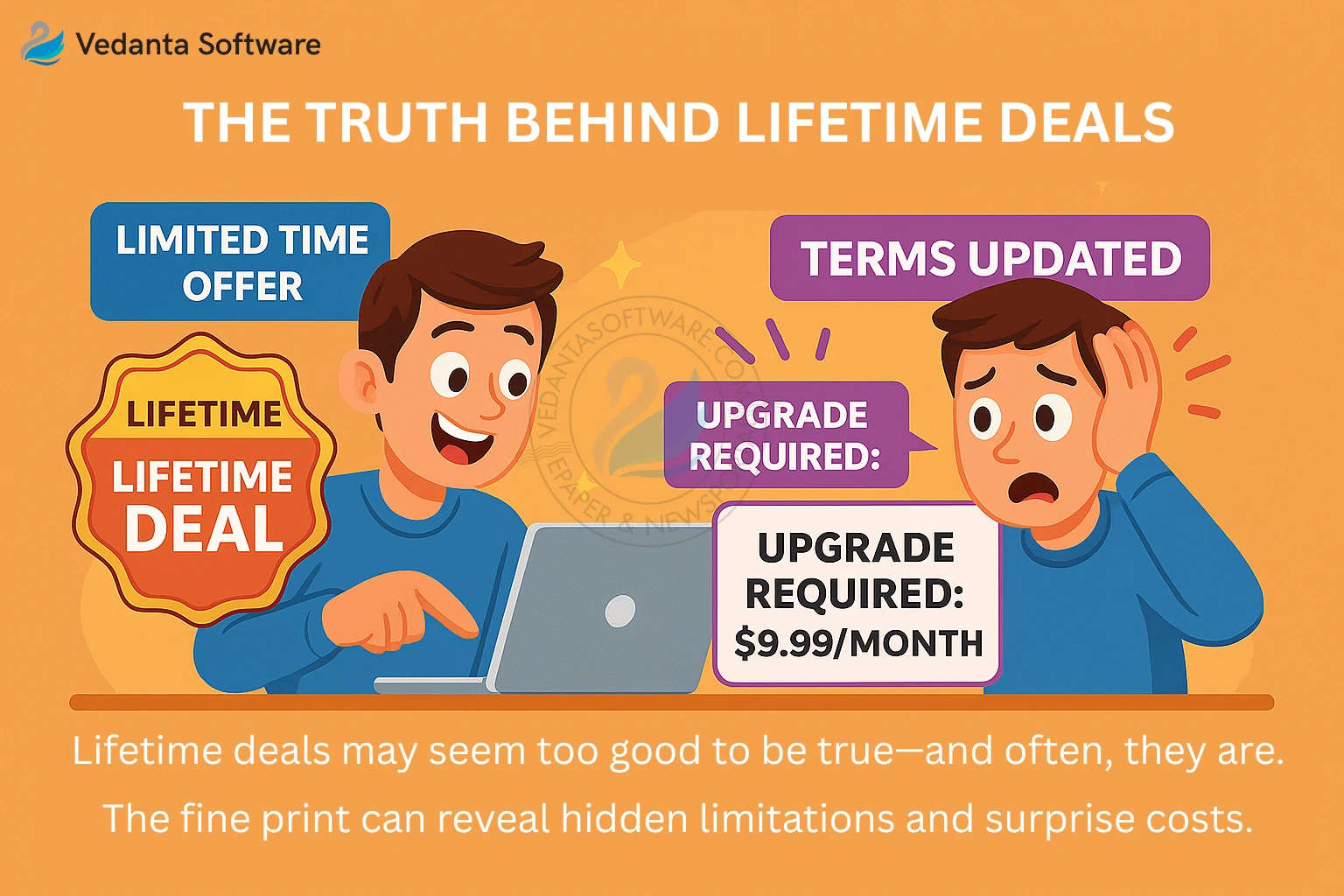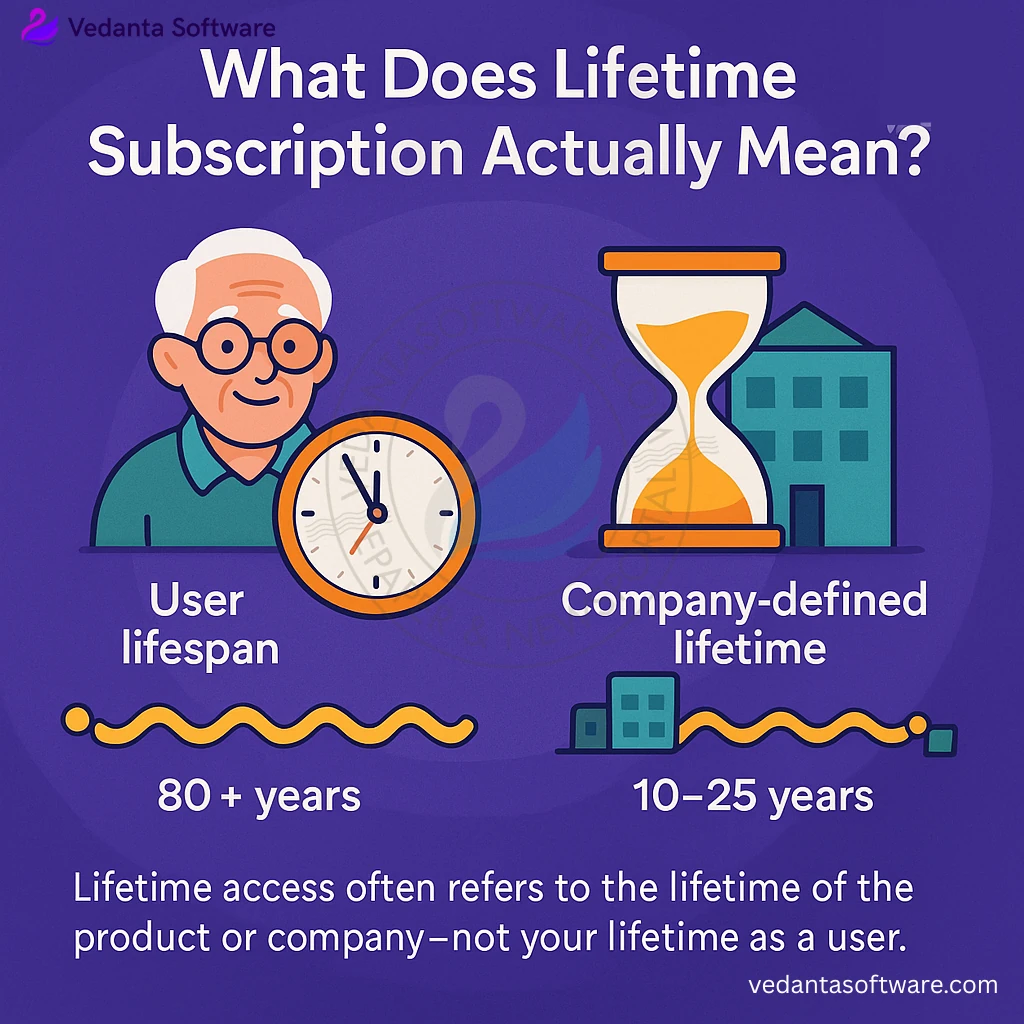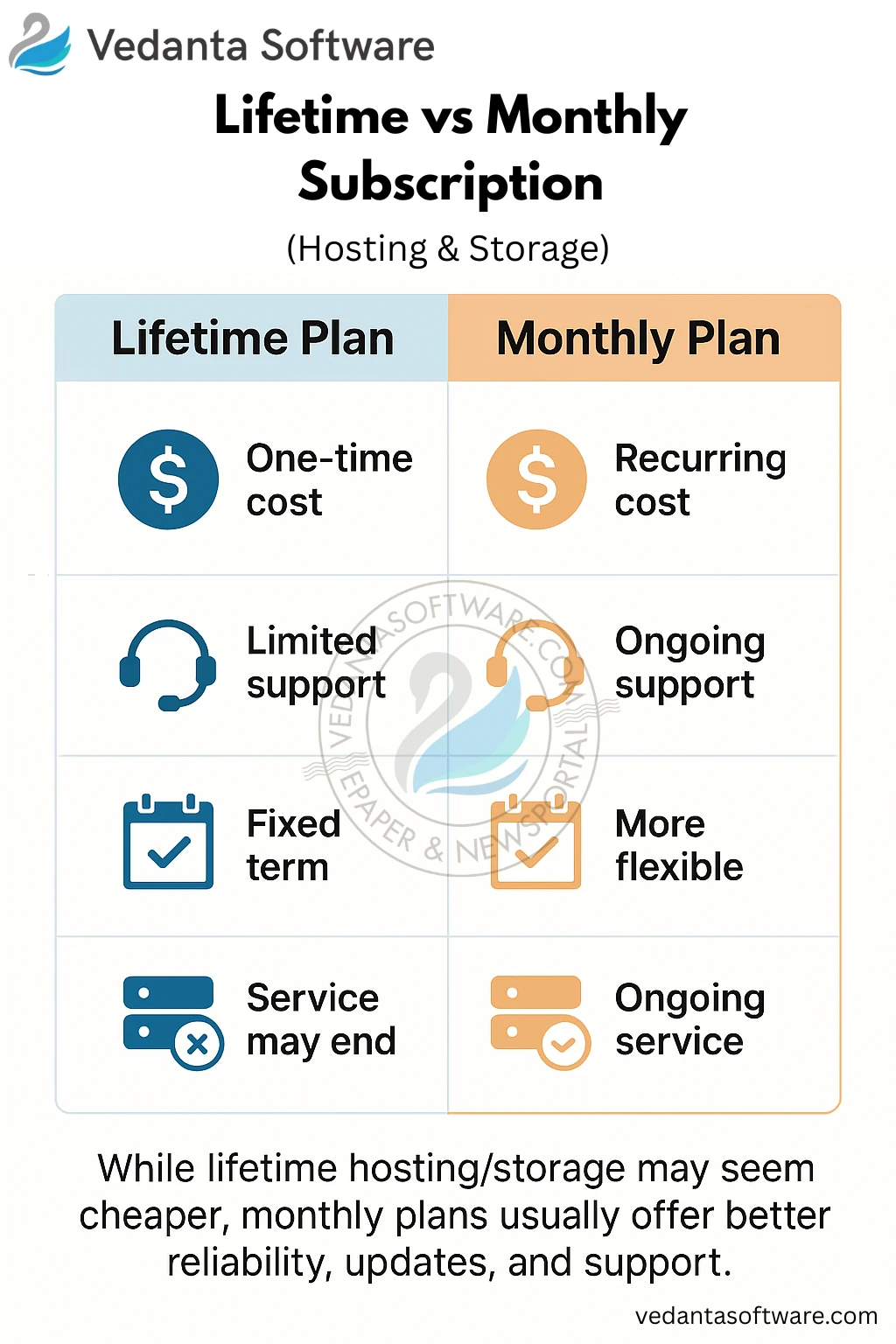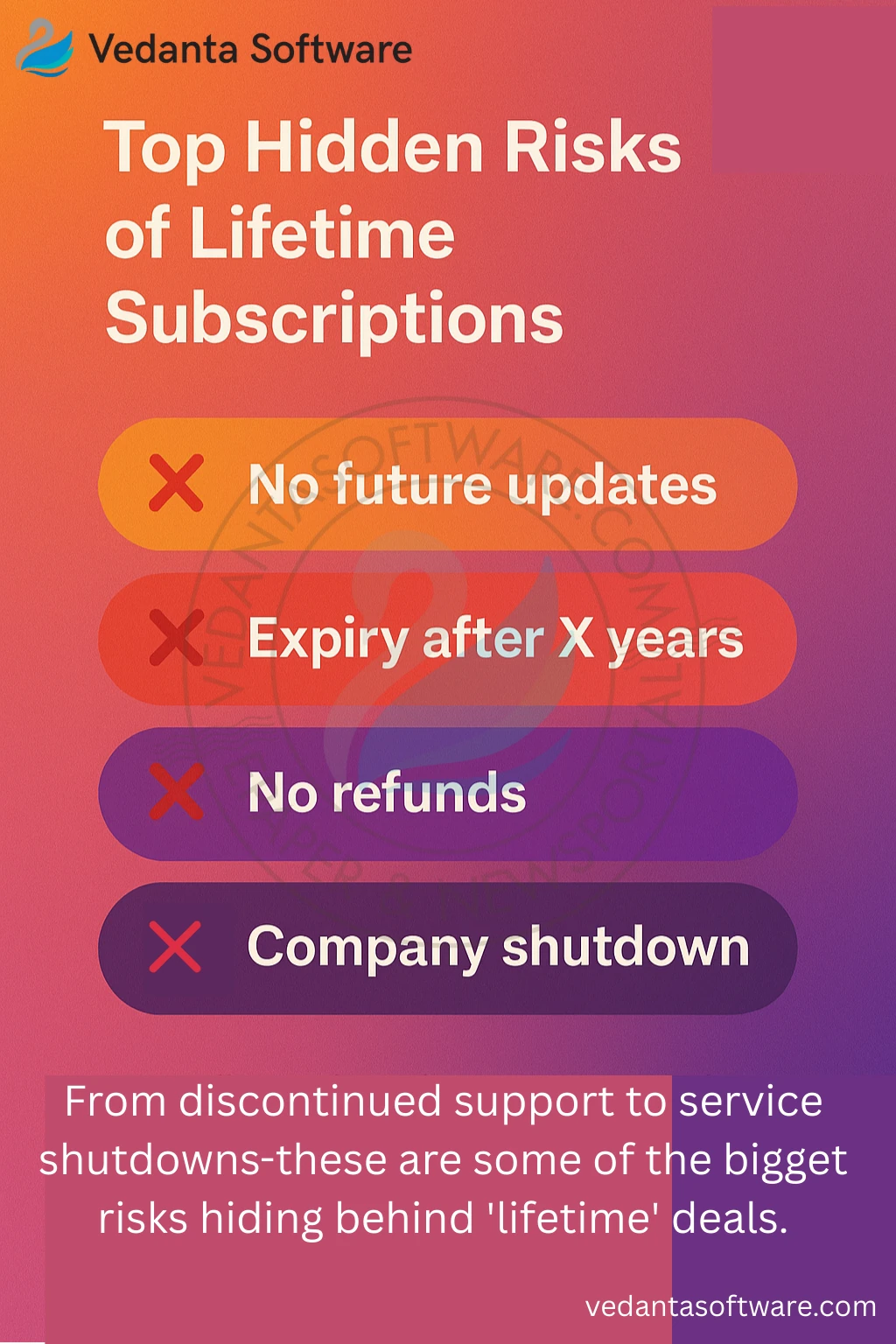View Blog
The Hidden Truth of Lifetime Subscriptions & Memberships in SaaS and Software Products
Posted By Ankur Gupta On 14 Apr 2025 13:00:11 Under Articles

Imagine this: You find an incredible deal online—"Lifetime Access to Premium Cloud Storage for Just $99!" Excited, you make the purchase, thinking you've secured unlimited storage forever. Fast forward three years, and you receive an email:
"We're updating our policies, and your lifetime subscription will now be limited to 500GB. For unlimited access, please upgrade to our new plan for $9.99/month."
Frustrated, you check the fine print and realize that "lifetime" actually meant the lifetime of the company’s product, not your lifetime.
Sounds familiar? You’re not alone. Many SaaS and software companies use lifetime subscriptions as a marketing strategy, but the reality often includes hidden restrictions, future costs, and risks that consumers don’t initially realize.
This article uncovers the hidden truth behind lifetime subscriptions, exposing the fine print that many companies don’t want you to notice. Let's explore whether lifetime deals are truly a great bargain—or just a cleverly disguised trap.
What Does a Lifetime Subscription Really Mean?
A lifetime subscription means a one-time payment for continued access to a product or service. However, what defines "lifetime" is often unclear. Many companies include terms in their policies that limit actual access duration, restrict service guarantees, or allow the provider to modify or cancel access under specific circumstances.

Hidden Terms & Conditions You Should Know
-
Cloud Storage Services: Some offer lifetime access but impose storage limits, reduce download speeds, or define "lifetime" as the operational life of the company—not the user’s lifespan.
-
SaaS Products: Many software companies advertise lifetime access but later stop updates, discontinue customer support, or revoke access if they shift to a new business model.
-
Streaming & Digital Content Services: Some services restrict lifetime memberships to the duration of their licensing agreements, meaning access could be revoked at any time without warning.
The Hidden Risks of Lifetime Subscriptions
1. Lifetime Doesn’t Always Mean Forever
Many lifetime deals actually have hidden expiration periods buried in the fine print. Some companies define "lifetime" as 10, 20, or 30 years—far less than what most consumers expect.
Example: A popular cloud storage provider promoted lifetime access but later clarified in their policy that the access was limited to 25 years or until they decided to discontinue the service.
2. No Guaranteed Updates or Support
Traditional subscription models ensure customers receive regular updates and support. However, lifetime subscribers often get stuck with outdated versions of the software.
Example: A well-known design software (e.g., Filmora) sold lifetime licenses but later launched a new version that required a separate purchase, making the old version obsolete.
3. Companies Can Shut Down or Change Business Models
Startups and smaller SaaS companies often sell lifetime deals for quick revenue. However, if they shut down or pivot their business, lifetime customers can lose access entirely.
Example: A VPN provider offered lifetime memberships but was later acquired by another company, which voided all lifetime subscriptions and forced users onto new paid plans.
4. No Refunds or Compensation
Many companies have strict no-refund policies in their terms. If the service degrades or disappears, customers have little recourse.
Example: A video editing software company promised lifetime access but later switched to a cloud-based model, refusing to compensate existing lifetime subscribers.
Web Hosting & Cloud Storage: How They Differ from Monthly Plans

Many web hosting and cloud storage providers also offer lifetime deals, but they often include hidden limitations. Let's compare them with standard monthly subscriptions.
Lifetime Web Hosting vs. Monthly Hosting
-
Lifetime Hosting: Often comes with hidden bandwidth limitations and strict fair usage policies. If you exceed a certain limit, they may suspend or downgrade your plan.
-
Monthly Hosting: Generally offers better scalability, customer support, and guaranteed service continuity.
Example: Some web hosting companies offer lifetime hosting, but in the fine print, they state that "lifetime" only lasts 10-15 years or until the company ceases operations.
Lifetime Cloud Storage vs. Monthly Storage Plans
-
Lifetime Storage (e.g., pCloud, IceDrive): May cap upload/download speeds, limit file-sharing options, or discontinue services without refunds.
-
Monthly Storage (e.g., Google Drive, Dropbox): Ensures consistent service, updates, and customer support.
Example: pCloud’s lifetime plan sounds appealing, but their terms mention that "lifetime" is 99 years or the duration of the company's existence, whichever is shorter.
The Risks for SaaS Providers
Lifetime subscriptions may generate quick revenue, but they also present long-term challenges for businesses.
1. Revenue Sustainability Issues
SaaS businesses rely on recurring revenue to grow. Lifetime subscriptions provide an initial cash influx but can create financial instability in the long run.
2. High Support & Maintenance Costs
Businesses offering lifetime deals must maintain servers, security updates, and customer support indefinitely without additional income.
3. Potential Brand Damage
If a company fails to deliver on its lifetime promise, it can lead to customer backlash, negative reviews, and loss of trust.
Best Practices for Consumers
If you’re considering a lifetime subscription, follow these steps:
-
Read the Fine Print – Check for expiration clauses, refund policies, and limitations.
-
Research the Company – Avoid startups that might shut down; choose well-established companies.
-
Assess Your Usage – If you won’t use the software regularly, a lifetime deal may not be worth it.
-
Watch for Red Flags – No refunds? No guaranteed updates? These are warning signs.
Best Practices for SaaS Providers
If your business is offering a lifetime subscription, ensure:
-
Transparent Terms – Clearly define what "lifetime" means.
-
Sustainable Pricing – Price the offer high enough to cover long-term costs.
-
Alternative Upsell Strategies – Consider hybrid models where lifetime users can pay for premium features or upgrades.
Conclusion
Lifetime subscriptions can be a double-edged sword. While they seem cost-effective at first, the hidden terms and long-term risks often outweigh the benefits. Consumers should always read the fine print before purchasing, while SaaS providers should carefully consider sustainability before offering such deals.
Have you ever purchased a lifetime subscription? What was your experience? Share your thoughts below!
About the Author
Ankur Gupta
Ankur Gupta is a seasoned software developer and entrepreneur with over 20 years of experience in building innovative digital solutions. He is the founder of Vedanta Software, a SAAS-based platform specializing in Newsportal CMS and ePaper CMS for publishers across India and beyond. With deep expertise in PHP, Yii2, CodeIgniter, ReactJS, Server Management, Linux, and a growing proficiency in Node.js, Ankur is passionate about creating scalable, user-friendly web applications. He is known for his hands-on approach and dedication to quality, mentoring his team to deliver robust and efficient software solutions tailored for the digital publishing industry.
News and Updates
 Vedanta Software is Revising Its SaaS Product Pricing from October 1st, 2025
Vedanta Software is Revising Its SaaS Product Pricing from October 1st, 2025
Vedanta Software revises SaaS pricing for Epaper & Newsportal CMS from Oct 1st, 2025. Renew now at current prices till Oct 31st. Learn more.
 Vedanta Software Recognized as India’s Top Job Creator 2025 By Apna
Vedanta Software Recognized as India’s Top Job Creator 2025 By Apna
Vedanta Software has been recognized by Apna as India’s Top Job Creator 2025 for its role in generating employment and empowering businesses with innovative SAAS solutions like Newsportal CMS and Epaper CMS.
 Introducing the New Video Tutorial Button – Instant Help, Right Where You Need It!
Introducing the New Video Tutorial Button – Instant Help, Right Where You Need It!
🚀 New Feature Alert! Vedanta Software introduces the Video Tutorial Button – your one-click gateway to instant, context-based help inside the admin dashboard. 🎯 Whether managing content or exploring features, get relevant video guides without leaving the page. 📹 Learn faster, work smarter – explore all tutorials anytime from the second tab!
Vedanta Software has been awarded “Software Company of the Year” at the Excellency Iconic Awards 2025 for its innovation in digital news publishing and CMS platforms for ePaper and Newsportal websites.
 Quick Fix: Website link preview thumbnail not showing on WhatsApp
Quick Fix: Website link preview thumbnail not showing on WhatsApp
Is your website's link thumbnail not appearing when you share it on WhatsApp? In this video post, we'll walk you through the steps to resolve this issue, which has been affecting many users after the latest #WhatsApp update.


